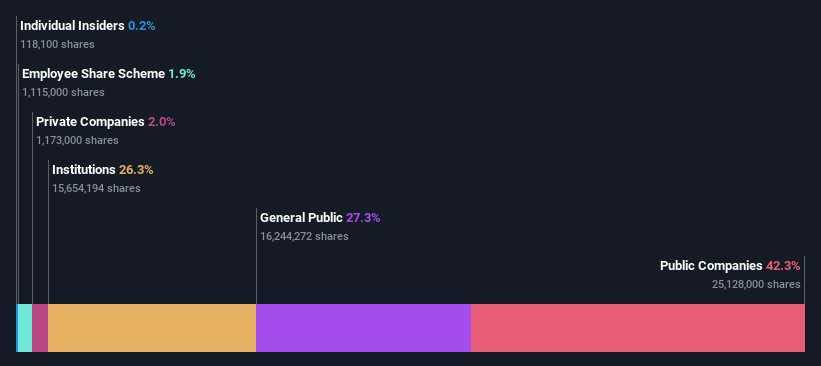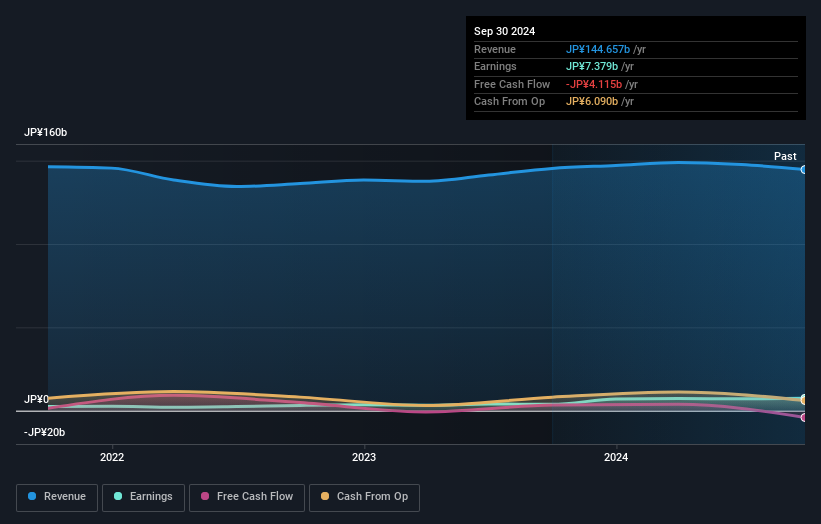- Japan
- /
- Specialty Stores
- /
- TSE:8291
Public companies are Nissan Tokyo Sales Holdings Co., Ltd.'s (TSE:8291) biggest owners and were rewarded after market cap rose by JP¥2.9b last week

Key Insights
- Significant control over Nissan Tokyo Sales Holdings by public companies implies that the general public has more power to influence management and governance-related decisions
- 57% of the business is held by the top 3 shareholders
- Institutional ownership in Nissan Tokyo Sales Holdings is 26%
If you want to know who really controls Nissan Tokyo Sales Holdings Co., Ltd. (TSE:8291), then you'll have to look at the makeup of its share registry. We can see that public companies own the lion's share in the company with 42% ownership. In other words, the group stands to gain the most (or lose the most) from their investment into the company.
As a result, public companies collectively scored the highest last week as the company hit JP¥28b market cap following a 12% gain in the stock.
In the chart below, we zoom in on the different ownership groups of Nissan Tokyo Sales Holdings.
Check out our latest analysis for Nissan Tokyo Sales Holdings

What Does The Institutional Ownership Tell Us About Nissan Tokyo Sales Holdings?
Many institutions measure their performance against an index that approximates the local market. So they usually pay more attention to companies that are included in major indices.
As you can see, institutional investors have a fair amount of stake in Nissan Tokyo Sales Holdings. This suggests some credibility amongst professional investors. But we can't rely on that fact alone since institutions make bad investments sometimes, just like everyone does. When multiple institutions own a stock, there's always a risk that they are in a 'crowded trade'. When such a trade goes wrong, multiple parties may compete to sell stock fast. This risk is higher in a company without a history of growth. You can see Nissan Tokyo Sales Holdings' historic earnings and revenue below, but keep in mind there's always more to the story.

We note that hedge funds don't have a meaningful investment in Nissan Tokyo Sales Holdings. The company's largest shareholder is Nissan Motor Co., Ltd., with ownership of 38%. For context, the second largest shareholder holds about 11% of the shares outstanding, followed by an ownership of 7.8% by the third-largest shareholder.
After doing some more digging, we found that the top 3 shareholders collectively control more than half of the company's shares, implying that they have considerable power to influence the company's decisions.
Researching institutional ownership is a good way to gauge and filter a stock's expected performance. The same can be achieved by studying analyst sentiments. We're not picking up on any analyst coverage of the stock at the moment, so the company is unlikely to be widely held.
Insider Ownership Of Nissan Tokyo Sales Holdings
While the precise definition of an insider can be subjective, almost everyone considers board members to be insiders. Management ultimately answers to the board. However, it is not uncommon for managers to be executive board members, especially if they are a founder or the CEO.
I generally consider insider ownership to be a good thing. However, on some occasions it makes it more difficult for other shareholders to hold the board accountable for decisions.
Our most recent data indicates that insiders own less than 1% of Nissan Tokyo Sales Holdings Co., Ltd.. However, it's possible that insiders might have an indirect interest through a more complex structure. It appears that the board holds about JP¥56m worth of stock. This compares to a market capitalization of JP¥28b. Many investors in smaller companies prefer to see the board more heavily invested. You can click here to see if those insiders have been buying or selling.
General Public Ownership
The general public-- including retail investors -- own 27% stake in the company, and hence can't easily be ignored. While this size of ownership may not be enough to sway a policy decision in their favour, they can still make a collective impact on company policies.
Public Company Ownership
We can see that public companies hold 42% of the Nissan Tokyo Sales Holdings shares on issue. It's hard to say for sure but this suggests they have entwined business interests. This might be a strategic stake, so it's worth watching this space for changes in ownership.
Next Steps:
It's always worth thinking about the different groups who own shares in a company. But to understand Nissan Tokyo Sales Holdings better, we need to consider many other factors. Case in point: We've spotted 2 warning signs for Nissan Tokyo Sales Holdings you should be aware of, and 1 of them shouldn't be ignored.
Of course this may not be the best stock to buy. So take a peek at this free free list of interesting companies.
NB: Figures in this article are calculated using data from the last twelve months, which refer to the 12-month period ending on the last date of the month the financial statement is dated. This may not be consistent with full year annual report figures.
Valuation is complex, but we're here to simplify it.
Discover if Nissan Tokyo Sales Holdings might be undervalued or overvalued with our detailed analysis, featuring fair value estimates, potential risks, dividends, insider trades, and its financial condition.
Access Free AnalysisHave feedback on this article? Concerned about the content? Get in touch with us directly. Alternatively, email editorial-team (at) simplywallst.com.
This article by Simply Wall St is general in nature. We provide commentary based on historical data and analyst forecasts only using an unbiased methodology and our articles are not intended to be financial advice. It does not constitute a recommendation to buy or sell any stock, and does not take account of your objectives, or your financial situation. We aim to bring you long-term focused analysis driven by fundamental data. Note that our analysis may not factor in the latest price-sensitive company announcements or qualitative material. Simply Wall St has no position in any stocks mentioned.
About TSE:8291
Nissan Tokyo Sales Holdings
Engages in the automobile dealership business in Japan.
Flawless balance sheet with proven track record and pays a dividend.

